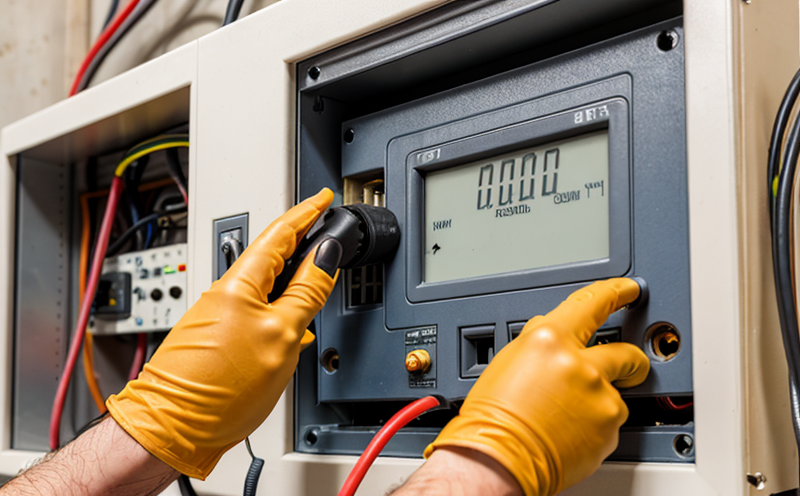IEEE 1725 Electrical Testing of Rechargeable Batteries for Mobile Phones
The IEEE 1725 standard is a comprehensive guide designed to ensure that rechargeable batteries used in mobile phones meet the necessary electrical performance and safety requirements. This test protocol covers critical aspects such as internal resistance measurement, capacity testing under various charge and discharge conditions, and voltage stability checks. The primary goal of this testing process is to provide manufacturers with reliable data on the battery's operational characteristics, ensuring consistent quality across different batches.
Internal resistance plays a crucial role in determining how efficiently power is delivered from the battery to the device. High internal resistance can lead to reduced performance and shorter lifespans for mobile phones. By measuring this parameter according to IEEE 1725, manufacturers can identify any issues early on during production or quality assurance stages.
Capacity testing involves discharging and recharging batteries multiple times while monitoring their voltage levels throughout the process. This helps in assessing how well a battery holds its charge over time—a key factor for consumer satisfaction. The standard specifies precise procedures for charging, discharging cycles, and temperature control to ensure accurate results. Properly conducted capacity tests not only help improve product reliability but also contribute significantly towards meeting regulatory requirements set forth by organizations like the International Electrotechnical Commission (IEC).
Voltage stability checks are essential in preventing potential safety hazards associated with fluctuating voltages within a battery pack. These fluctuations could cause damage to internal components or even pose risks during usage. By adhering strictly to IEEE 1725 guidelines, laboratories can provide assurance that all batteries meet stringent voltage regulation standards.
The implementation of such rigorous testing ensures not only compliance with industry norms but also enhances the overall durability and safety profile of mobile phone batteries. For instance, many leading brands have adopted these practices as part of their commitment to delivering high-quality products. Additionally, passing this type of certification can enhance a company's reputation among consumers who value reliability over price alone.
Compliance with IEEE 1725 helps manufacturers maintain consistency in production processes which ultimately translates into better customer experiences. It also plays an important role in reducing warranty claims and returns by identifying defective units early on through thorough testing procedures before they reach the market place.
Why It Matters
The IEEE 1725 standard is vital for ensuring that rechargeable batteries used in mobile phones perform reliably under various conditions. By adhering to this protocol, manufacturers can guarantee consistent quality across all products produced, thereby enhancing customer trust and satisfaction.
- Enhanced Reliability: Ensures dependable performance of the battery throughout its lifecycle, reducing the likelihood of failures during use.
- Better Consumer Experience: Improves overall user experience by providing longer-lasting devices with optimal power delivery capabilities.
- Regulatory Compliance: Helps meet international standards and regulations set by bodies such as IEC or European Union directives regarding electrical safety.
Benefits
- Promotes Consistency in Quality: Ensures that every batch of batteries produced adheres to the same high standards, leading to more predictable performance across devices.
- Reduces Warranty Claims and Returns: Identifies defects early on through thorough testing procedures, minimizing post-sale issues for consumers.
- Increases Brand Reputation: Demonstrates a commitment to excellence in product development, helping companies establish themselves as leaders in the industry.
By incorporating IEEE 1725 into their manufacturing processes, companies can ensure that they are delivering superior products that meet or exceed customer expectations. This not only strengthens brand loyalty but also fosters long-term relationships with satisfied customers.
Why Choose This Test
Selecting IEEE 1725 electrical testing for rechargeable batteries offers several advantages over alternative methods:
- Precision Measurement: Utilizes advanced instruments capable of providing highly accurate measurements, ensuring reliable data.
- Comprehensive Coverage: Addresses multiple aspects including internal resistance, capacity retention, and voltage stability, giving a holistic view of battery performance.
- Industry-Recognized Standard: Adheres to internationally accepted norms recognized by leading organizations worldwide, adding credibility to test results.
Furthermore, choosing IEEE 1725 means accessing expert knowledge and state-of-the-art facilities dedicated solely to battery testing. This allows for more precise evaluations tailored specifically to the unique needs of mobile phone batteries.
In conclusion, implementing IEEE 1725 electrical testing is essential for maintaining top-notch quality standards in the production of rechargeable batteries used in mobile phones. It provides numerous benefits ranging from enhanced reliability and reduced warranty claims to increased brand reputation and regulatory compliance. By opting for this rigorous method, manufacturers can ensure they are delivering products that meet or surpass customer expectations while staying ahead of competitors.





